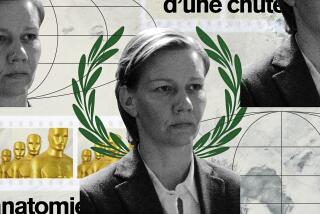Oscars 2013: ‘Zero Dark Thirty’ is undeserving victim of politics
If you’re keeping score this Oscar season — and who isn’t? — chalk up this year’s nominations as a victory for the bullying power of the United States Senate and an undeserved loss for “Zero Dark Thirty” in general and director Kathryn Bigelow in particular.
Yes, “Zero Dark” did get five nominations, including best picture, lead actress for Jessica Chastain and original screenplay for Mark Boal. But that was only one more than for the ineffective “Anna Karenina” and nowhere near the 12 picked up by Steven Spielberg’s front-running “Lincoln.”
Worse than that, Bigelow, the same filmmaker who won the directing Oscar in 2010 for “The Hurt Locker,” could not manage so much as a nomination for a piece of work that has been almost universally acknowledged as formidable. What changed between then and now? Three members of the Senate, a deliberative body not previously known for its cinematic acumen, decided to place their feet on the neck of this particular film.
Back on Dec. 19, Sens. Dianne Feinstein (D-Calif.), Carl Levin (D-Mich.) and John McCain (R-Ariz.) wrote an open letter to “express our deep disappointment with ‘Zero Dark Thirty.’ We believe the film is grossly inaccurate and misleading in its suggestion that torture resulted in information that led to the location of Usama Bin Laden.”
To anyone who knows the academy’s traditional aversion to controversy (for example, disagreement dogged “The People vs. Larry Flynt” and the highly regarded “The Hurricane” ended up with only one nomination, for star Denzel Washington, after questions were raised about its accuracy) knew that letter meant Oscar trouble for “Zero.” It’s not even that surprising that it was the directors who caved in to the drumbeat of condemnation. As one of the smaller voting branches of the academy, it is more susceptible to the vagaries of outside pressure.
Once the senators signaled that it was open season on the film, it was a given that in this age of Internet bloviating, other voices would join in. Naomi Wolf, for instance, writing in Britain’s the Guardian, called Bigelow “an apologist for evil” comparable to Nazi-era German filmmaker Leni Riefenstahl and howled that the director “will be remembered forever as torture’s handmaiden.”
OSCARS 2013: Complete list | Reactions | Trivia | Ballot
If it hadn’t inflicted undeserved harm on “Zero,” this entire fuss could be looked at as a backhanded tribute to the continued power of film in our society. The senators’ plan, which worked beautifully, was to use the high profile of “Zero Dark Thirty” to place the eradication of torture on the national agenda. It’s a worthwhile goal which I wholeheartedly agree with; it’s just a shame that a blameless film became collateral damage in that quest.
Imagine, if you will, that Peter O’Toole kicked a camel in a scene in “Lawrence of Arabia” and a PETA-loving senator roundly denounced the film as advocating the inhumane treatment of animals. Wait, you’d say, this movie is not really about the mistreatment of animals, and kicking camels did not lead to Lawrence’s success. The truth about “Zero Dark Thirty” is that it is not a film about torture nor does it say, despite what you’ve read, that torture is an effective way of gathering information.
I saw “Zero Dark Thirty” early on, without the benefit of the wisdom of the Senate to tell me what I ought to be thinking. I was revolted by the depictions of waterboarding and other kinds of torture, scenes so brutal that I left the theater convinced this is behavior no American should engage in.
OSCARS 2013: Ballot | Oscar Watch | Timeline | Full coverage
The senators are within their constitutional rights to insist that “Zero” says that torture led the CIA directly to Bin Laden, but that is not the film I saw. Of the two key prisoners who are tortured on camera, one flat out lies to the interrogators and the other never says anything no matter what is done to him. Hardly a ringing endorsement of enhanced interrogation techniques.
The CIA does get a piece of information from that recalcitrant man, but it is the guile of interrogators employed well after the torture that does the trick. If “Zero Dark Thirty” has any message about what led to Bin Laden’s location, it’s that, rather than torture, it was the slow, meticulous, painstaking gathering of information over nearly a decade by Chastain’s character Maya that did the job.
Bigelow gave an eloquent defense of her film when she accepted the directing award at the New York Film Critics Circle Awards on Monday night. “I thankfully want to say that I’m standing in a room of people who understand that depiction is not endorsement, and if it was, no artist could ever portray inhumane practices,” she said. “No author could ever write about them and no filmmaker could ever delve into the knotty subjects of our time.”
Amen to that.
MORE OSCAR COVERAGE
Play-at-Home Oscar Ballot 2013
TIMELINE: Academy Awards through the years
More to Read
From the Oscars to the Emmys.
Get the Envelope newsletter for exclusive awards season coverage, behind-the-scenes stories from the Envelope podcast and columnist Glenn Whipp’s must-read analysis.
You may occasionally receive promotional content from the Los Angeles Times.







